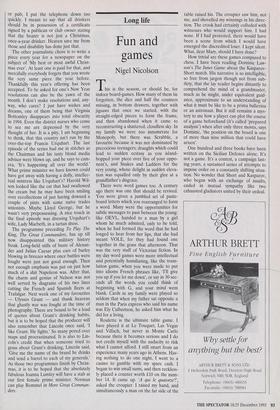Long life
Fun and games
Nigel Nicolson
This is the season, or should be, for indoor board-games. How many of them lie forgotten, the dice and half the counters missing, in bottom drawers, together with jigsaws that once we started, with the straight-edged pieces to form the frame, and then abandoned when it came to reconstructing a shattered, cloudless sky. In my family we were too innumerate for Monopoly, but there was Scrabble, a favourite because it was not dominated by precocious teenagers; draughts which could lead to sudden ecstasy as you island- hopped your piece over five of your oppo- nent's, and Snakes and Ladders for the very young, whose delight in sudden eleva- tion was equalled only by their glee at a grandfather's disgrace.
There were word games too. A century ago there was one that should be revived. You were given a jumbled set of paste- board letters which you rearranged to form a word. Many were the opportunities for subtle messages to pass between the young: like OEVL, handed to a man by a girl whom he much admired, only to be told, when he had formed the word that he had longed to hear from her lips, that she had meant VOLE, for they had found one together in the grass that afternoon. That was the very stuff of Victorian fiction. In my day word games were more intellectual and potentially humiliating, like the trans- lation game, when you were made to put into idioms French phrases like, 'I'll give you up if you let me down', or say in 30 sec- onds all the words you could think of beginning with G, and your mind went blank. Cards in my family were played so seldom that when my father sat opposite a man in the Paris express who said his name was Ely Culbertson, he asked him what he did for a living.
Roulette is the ultimate table game. I have played it at Le Touquet, Las Vegas and Villach, but never in Monte Carlo because there it becomes serious and I do not credit myself with the audacity to risk what I cannot afford. I still smart from an experience many years ago in Athens. Hav- ing nothing to do one night, I went to a casino to gamble with my spare cash. I began to win small sums, and then reckless- ly placed a counter worth £10 on the num- ber 14. It came up. 'A qui le quatorze?', asked the croupier. I raised my hand, and simultaneously a man on the far side of the
table raised his. The croupier saw him, not me, and shovelled my winnings in his direc- tion. The crook had certainly colluded with witnesses who would support him. I had none. If I had protested, there would have been a scene from which I would have emerged the discredited loser. I kept silent. What, dear Mary, should I have done?
How trivial are these games compared to chess. I have been reading Dominic Law- son's The Inner Game about the Kasparov- Short match. His narrative is so intelligible, so free from jargon though not from sub- tlety, that the lay reader begins distantly to comprehend the mind of a grandmaster, much as he might, under equivalent guid- ance, approximate to an understanding of what it must be like to be a prima ballerina or an astronaut. But it still remains a mys- tery to me how a player can plot the course of a game beforehand (it's called 'prepared analysis') when after only three moves, says Dominic, 'the position on the board is one of more than nine million that could have arisen'.
One hundred and three books have been written on the Sicilian Defence alone. It's not a game. It's a contest, a campaign last- ing years, a sustained series of attempts to impose order on a constantly shifting situa- tion. No wonder that Short and Kasparov, who began with an exchange of insults, ended in mutual sympathy like two exhausted gladiators united by their ordeal.










































































































 Previous page
Previous page